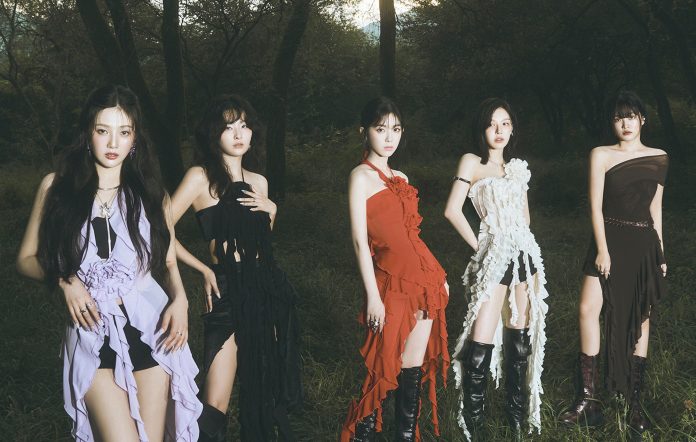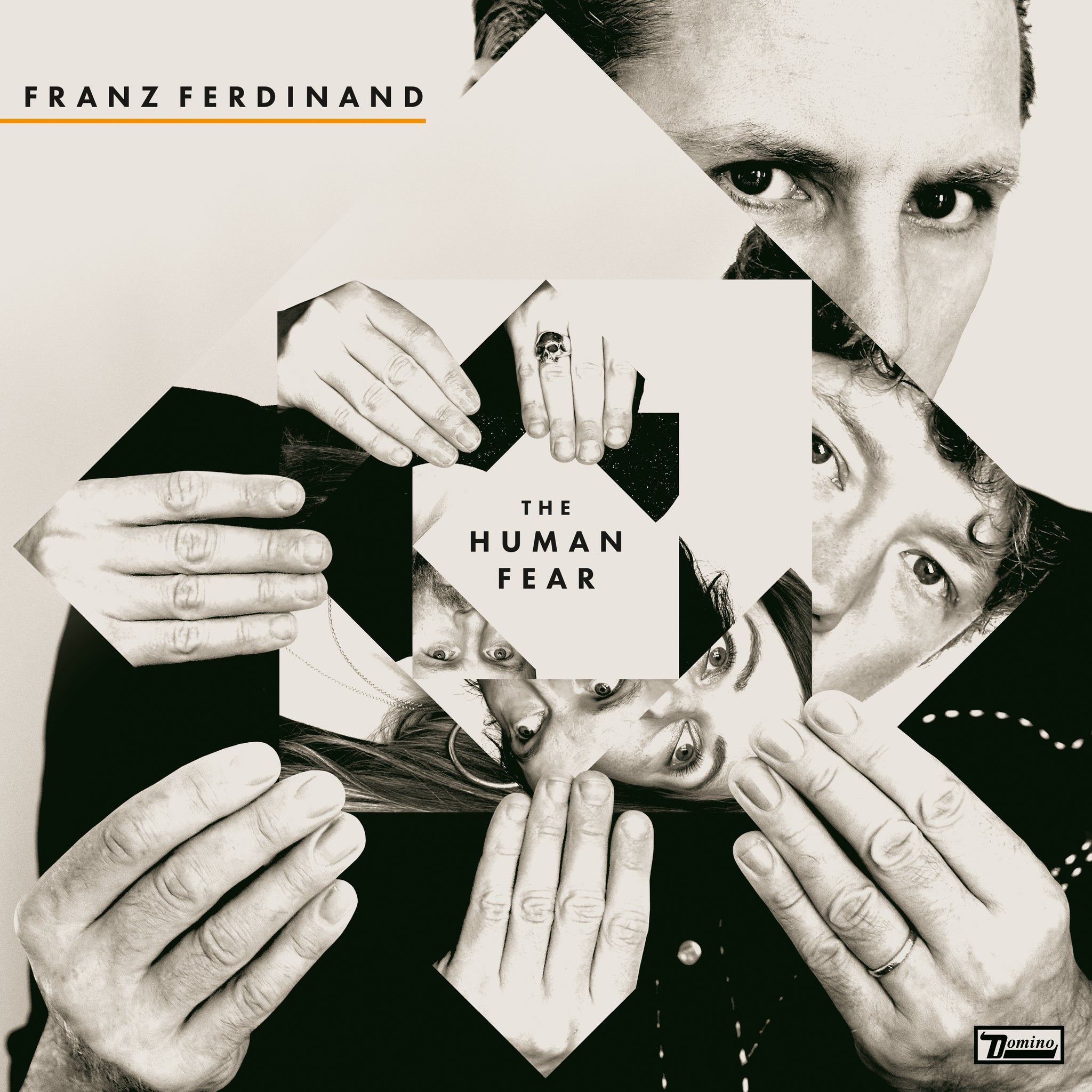
For a while, something had been amiss in Red Velvet’s charm – the tail-end of their contract renewals and a string of largely forgettable releases prompted conversations about the group’s direction for the future, which is why ‘Chill Kill’ is such a welcome reprieve. With their third studio album, Red Velvet have returned to what they do best – spinning chilling tales with flawless harmonies at the centre.
While we will address the eponymous title track ‘Chill Kill’ in just a moment, let’s give due credit to the other tracks on the album. All of them collectively contribute to the group’s reputation for having the best B-sides in K-pop, which often overshadow the title track itself, if one might dare say.
‘Knock Knock’ opens with bone-chilling harmonies by the group, layered over what appears to be a sample of Tchaikovsky’s ‘Dance of the Sugar Plum Fairy’. Then, as sharp string and bass alternate, unfolds an Edgar Allan Poe-esque game of hide and seek. Propped up by imagery of desolate playgrounds and “deepening loneliness like the walking dead”, the group imagine running away from someone eerily resembling yourself. It’s all so perfectly reminiscent of the Red Velvet of yore that perhaps ‘Knock Knock’ should have been the album’s lead single.

The vivid storytelling on the album is, in fact, the best part. Between orchestral arrangements and retro swing rhythms, songs like ‘Nightmare’ resemble slices of time carved out of a Victorian gothic horror novel. The members’ clear, expansive voices spark imagery of a young woman walking down a dark, foggy London street, picking up the pace ever so slightly as the street lamps inexplicably start going out.
“I’m your poet / I’m your pain,” say the group on ‘Bulldozer’, layering a challenge over powerful bass, as if testing your resolve to hold on during a wild ride. Elsewhere, on ‘Underwater’ – a strong contender for the best track on the album – we are baptised in an ocean of beats, complex harmonies and evocative depictions of being swept away by deep, uncharted waters. The all-encompassing treatment continues on ‘Iced Coffee’ and ‘One Kiss’, given how atmospheric and cinematic they are.
Heightening this tragedy are the lighter counterparts on the album, embodying the ‘hopeful’ nature of Red Velvet’s dual concept. The more uplifting tracks like ‘Wings’ and ‘Scenery’ can be considered more ‘red’ than ‘velvet’, but they create the ebb and flow that make the highs that much more impactful. ‘Will I Ever See You Again?’, however, deserves a special nod for making us feel like we’re witches joyously frolicking around a forest fire.
Even when it was described as a blend of “tragedy and hope” by Wendy, expectations were for a twisted version of hope rather than the sonic shift that was eventually presented. Suffice to say, ‘Chill Kill’ suffers from this switch up. Despite the strong start – where menacing synths and heavy beats build fear and excitement alike – the chorus is more a dampener than a catalyst. As it stands, the song is less a juxtaposition and more a clash between two opposing forces.
Red Velvet might have drawn us in with some duplicity – using deliciously dark teasers for a title track that turned out to be a disappointing sleight of hand – but we’ll willingly stay for the delightfully macabre B-sides. The nights are getting longer, the days are getting colder and Red Velvet are finally back with another thrillingly demonic album. It is, indeed, another ‘Chill Kill’ for this quintet.


Franz Ferdinand transitioned gracefully to legacy act. That they were a retro band from the start, intoxicated by new wave danciness and Britpop optimism, surely helped. Now in its third decade, the Glasgow quintet released a greatest hits album in 2022 but resisted the lure of the 20th-anniversary tour last year when 2004’s indelible debut hit that milestone, prioritizing new material in setlists instead. They’ve never released an irredeemably bad album, never chased trends or hollow rebrands, even if in recent years their studio output has slowed to a trickle.
That, too, is a perk of legacy status: You don’t have to release an album every two years. These Scots don’t rush: The time elapsed since their fifth album, 2018’s peppy, disco-colored Always Ascending, is longer than the Great War sparked by the assassination of the Archduke. Now, at long last, comes a new album that sounds… a whole lot like Always Ascending.
Breezy and unflappably upbeat, these tunes summon the vintage swagger and suave humor of Franz Ferdinand’s early records but little of the punkish exhilaration. Alex Kapranos is older and wiser: “Did you ever get the feeling that there’s something come undone?” he croons as “Audacious” kicks into pleasantly ruffled gear, still managing to marshall some anti-defeatist optimism for the McCartney-esque pop of the chorus (“Don’t stop feeling audacious/There’s no one to save us/So just carry on”). “Build It Up,” one of several songs co-written by keyboardist Julian Corrie, is funky and light on its feet, with a chorus that packs enough momentum for festival stages.
A loose concept gives The Human Fear some shape and purpose. Kapranos describes it as “a bunch of songs searching for the thrill of being human via fears.” Not that there’s much soul-baring here; like his Britpop forebears, Kapranos specializes in character sketches and sardonic vignettes instead. On “The Doctor,” he cheekily plays a hospital patient who refuses to go home: “I have nurses I can talk to and thermometers to hold.” “Bar Lonely” offers vignettes from a sad-sack watering hole where “everybody here is alone, just like you,” though handclaps and hooky bah-bah-bah-bahs keep it light.
Still, for an album ostensibly inspired by terror and thrill, The Human Fear plays it pretty safe. The songs are amiable and easygoing, with plenty of hooks but few big swings; there’s not much to trigger an adrenaline shock. Only on “The Birds,” a spiky, post-punk curveball of a closer, does the band wig out and summon some real anxiety. Otherwise, when Franz Ferdinand stray from their comfort zone, the results are embarrassing (the electroclash misfire “Hooked,” outfitted with an EDM drop) or just nearly weird enough to entertain (the klezmer-inspired curio “Black Eyelashes”).
“They’re poised to be the next Duran Duran or the next Pulp,” a critic for this website wrote 21 years ago, reviewing Franz Ferdinand’s self-titled. “Or they could be the next Menswear.” Instead, Franz Ferdinand plowed a comfortable path somewhere in between; respected but not revered, they deliver an album every half-decade or so to remind you why you loved them in the early aughts. The Human Fear isn’t provocative enough to revitalize their reputation, but it certainly won’t do it any harm.
All products featured on Pitchfork are independently selected by our editors. However, when you buy something through our retail links, we may earn an affiliate commission.